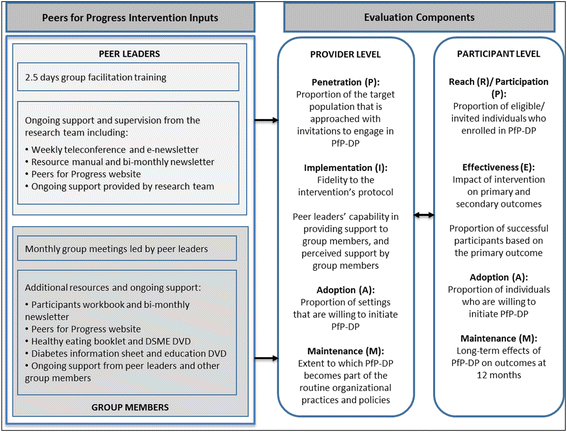Peer support to improve diabetes care: an implementation evaluation of the Australasian Peers for Progress Diabetes Program
- PMID: 29454327
- PMCID: PMC5816559
- DOI: 10.1186/s12889-018-5148-8
Peer support to improve diabetes care: an implementation evaluation of the Australasian Peers for Progress Diabetes Program
Abstract
Background: Several studies have now demonstrated the benefits of peer support in promoting diabetes control. The aim of this study is to evaluate the implementation of a cluster randomised controlled trial of a group-based, peer support program to improve diabetes self-management and thereby, diabetes control in people with Type 2 Diabetes in Victoria, Australia.
Methods: The intervention program was designed to address four key peer support functions i.e. 1) assistance in daily management, 2) social and emotional support, 3) regular linkage to clinical care, and 4) ongoing and sustained support to assist with the lifelong needs of diabetes self-care management. The intervention participants attended monthly group meetings facilitated by a trained peer leader for 12 months. Data was collected on the intervention's reach, participation, implementation fidelity, groups' effectiveness and participants' perceived support and satisfaction with the intervention. The RE-AIM and PIPE frameworks were used to guide this evaluation.
Results: The trial reached a high proportion (79%) of its target population through mailed invitations. Out of a total of 441 eligible individuals, 273 (61.9%) were willing to participate. The intervention fidelity was high (92.7%). The proportion of successful participants who demonstrated a reduction in 5 years cardiovascular disease risk score was 65.1 and 44.8% in the intervention and control arm respectively. Ninety-four percent (94%) of the intervention participants stated that the program helped them manage their diabetes on a day to day basis. Overall, attending monthly group meetings provided 'a lot of support' to 57% and 'moderate' support to 34% of the participants.
Conclusion: Peer support programs are feasible, acceptable and can be used to supplement treatment for patients motivated to improve behaviours related to diabetes. However, program planners need to focus on the participation component in designing future programs. The use of two evaluation frameworks allowed a comprehensive evaluation of the trial from the provider-, participant- and public health perspective. The learnings gained from this evaluation will guide and improve future implementation by improving program feasibility for adoption and acceptability among participants, and will ultimately increase the likelihood of program effectiveness for the participants.
Trial registration: Australian New Zealand Clinical Trials Registry (ANZCTR) ACTRN12609000469213 . Registered 16 June 2009.
Keywords: Implementation evaluation; PIPE impact metric; Participant-level factors; Peer support; Provider-level factors; Public health impact; RE-AIM framework; Self-management; Type 2 diabetes.
Conflict of interest statement
Authors’ information
Twitter:@micriddell.
ORCID ID:
Ethics approval and consent to participate
The study received ethics approval from the Monash University Human Research Ethics Committee (MUHREC) Project number CF09/1692 –2009000920. Participants were given a detailed participant information sheet after which written informed consent from all participants was obtained.
Consent for publication
Not applicable.
Competing interests
The authors declare that they have no competing interests.
Publisher’s Note
Springer Nature remains neutral with regard to jurisdictional claims in published maps and institutional affiliations.
Figures
References
-
- UN General Assembly Resolution 66/2 . Sixty-sixth session of the United Nations general assembly. New York: United Nations; 2011. Political declaration of the high-level meeting of the general assembly on the prevention and control of noncommunicable diseases.
-
- Murray CJ, Barber RM, Foreman KJ, Abbasoglu Ozgoren A, et al. Global, regional, and national disability-adjusted life years (DALYs) for 306 diseases and injuries and healthy life expectancy (HALE) for 188 countries, 1990-2013: quantifying the epidemiological transition. Lancet. 2015;386(10009):2145–2191. doi: 10.1016/S0140-6736(15)61340-X. - DOI - PMC - PubMed
-
- International Diabetes Federation (IDF). Diabetes Atlas – 7th Edition [Internet]. Brussels (Belgium): IDF Diabetes Atlas 2015. Available from: http://www.diabetesatlas.org/. Accessed 10 May 2017.
Publication types
MeSH terms
LinkOut - more resources
Full Text Sources
Other Literature Sources
Medical


